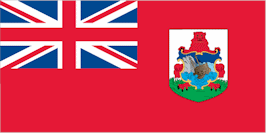Bermuda - British Colony
 Because of its limited land area, Bermuda has had difficulty with over-population. In the first two centuries of settlement it relied on steady human emigration to keep the population manageable. It is often claimed that, before the American Revolution more than ten thousand Bermudians (over half of the population) emigrated, primarily to the American South, where Great Britain was displacing Spain as the dominant European imperial power.
Because of its limited land area, Bermuda has had difficulty with over-population. In the first two centuries of settlement it relied on steady human emigration to keep the population manageable. It is often claimed that, before the American Revolution more than ten thousand Bermudians (over half of the population) emigrated, primarily to the American South, where Great Britain was displacing Spain as the dominant European imperial power.
The early history of Bermuda is in many important points similar to that of New England. Like motives had in most instances induced emigration, and the distinguished characteristics of those people were repeated here.
Like the Salem and Boston colonists, they had their witchcraft delusions, anticipating that, however, some twenty years, Christian North was tried for it in 1668, but was acquited. Somewhat later an African woman, Sarah Basset, was burned at Paget, for the same offense. The Quakers were persecuted, by fines, imprisonment, and banishment, by the stern and dark-souled Puritans, who had emigrated to this place to escape oppression, and to enjoy religious toleration, but were not willing to grant to others, that differed from them in their religious belief, the same privileges as they themselves enjoyed.
A steady trickle of outward migration continued. With seafaring being the only real industry, by the end of the 18th century at least a third of the island's manpower was at sea at any one time. The archipelago's limited land area and resources led to the creation of what may be the earliest conservation laws of the New World. In 1616 and 1620 acts were passed banning the hunting of certain birds and young tortoises.
From 1630 to 1660 many african and Indian slaves were brought to the colony. The slaves from Africa and the West Indies, and a large number of Indians from Massachusetts, prisoners taken in the Pequot and King Phillip's wars. The traces of their Indian ancestry can readily be seen in many of the people of these islands at the present time.
In October, 1661, the Protestant inhabitants were alarmed by rumors of a proposed combination between the africans and the Irish. The plan was to arm themselves, and massacre the whites who were not Catholics. Fortunately the plot was discovered in time, and measures adopted to disarm the slaves and the disaffected.
In 1649, the English Civil War raged and King Charles I was beheaded in Whitehall, London. The execution resulted in the outbreak of a Bermudian civil war; it was ended by embodied militias. This created a strong sense of devotion to the crown for the majority of colonists and it forced those who would not swear allegiance, such as Puritans and independents, into exile in the Bahamas.
Bermuda Gazette of 12 November, 1796, called for privateering against Spain and its allies, and with advertisements for crew for two privateer vessels.
In the 17th century the Somers Isles Company suppressed shipbuilding, as it needed Bermudians to farm in order to generate income from the land. Agricultural production met with only limited success, however. The Bermuda cedar boxes used to ship tobacco to England were reportedly worth more than their contents. The colony of Virginia far surpassed Bermuda in both quality and quantity of tobacco produced. Bermudians began to turn to maritime trades relatively early in the 17th century, but the Somers Isles Company used all its authority to suppress turning away from agriculture. This interference led to the islanders demanding, and receiving, the revocation of the Company's charter in 1684; the Company itself being dissolved.
After the dissolution of the Somers Isle Company, Bermudians rapidly abandoned agriculture for shipbuilding, replanting farmland with the native juniper (Juniperus bermudiana, also called Bermuda cedar) trees that grew thickly over the whole island. Establishing effective control over the Turks Islands, Bermudians deforested their landscape to begin the salt trade that would become the world's largest, and remained the cornerstone of Bermuda's economy for the next century. Bermudian sailors would turn their hands to far more trades than supplying salt, however.
Whaling, privateering, and the merchant trade were all pursued vigorously. Vessels would sail the normal shipping routes, but had to engage an enemy vessel no matter the size or strength, and as a result many ships were destroyed. The Bermuda sloop became highly regarded for its speed and manuverability. In fact, it was the Bermuda sloop HMS Pickle, one of the fastest vessels in the Royal Navy, that brought the news of the victory at Trafalgar and the death of Admiral Nelson back to England.
|
NEWSLETTER
|
| Join the GlobalSecurity.org mailing list |
|
|
|

